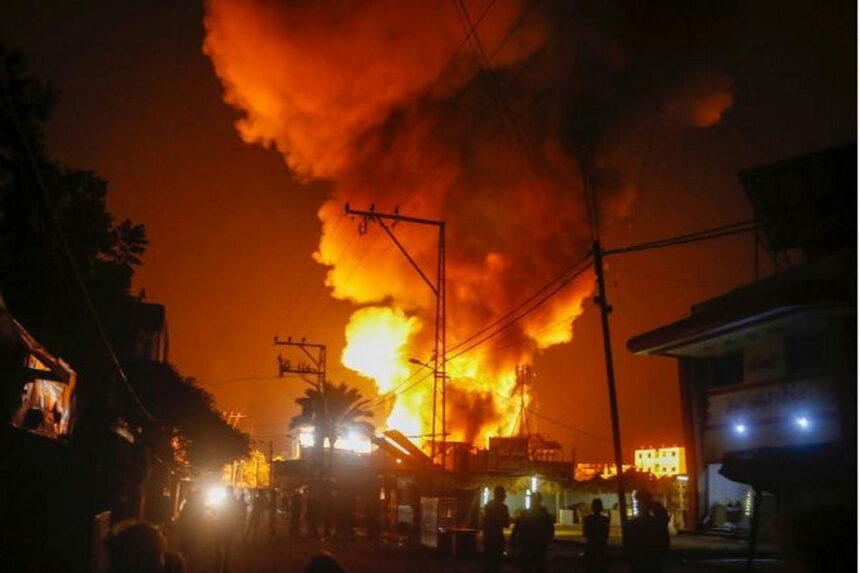Since Donald Trump won the 2024 US presidential elections, the world has been talking about his possible changes in American foreign policy, particularly regarding the never-ending conflict between Israel and Palestine.
With the global community waiting to see whether Trump’s presidency indeed heralds a change in US practice, hopeful-if cautious-optimism on how such a change in leadership might have an impact on the conflict in Gaza has been voiced within Hamas. What is being asked for by Hamas and Palestinians more widely is that a new US administration will be a positive step toward peace and stability in the region.
Hamas Expects a Shift in American Policy towards the Gaza Strip
The administration change has evoked a fusillade of reactions from world leaders and factions; however, the response by Hamas has turned out to be the talk of the town. One Basem Naim, a senior member of the Hamas Political Bureau, has recently stated regarding the victory of Trump.
Naim expressed his hope that the new president could intervene in this long-lasting conflict and push the United States toward a more even handed course in its relations with Israel. Naim’s comments captured the broader Palestinian yearning for a path toward peace, and how it would take a recalibration of US policy-which over recent years has largely supported Israel’s actions in Gaza.
According to Naim, the outcome of the US election might look very much like an internal affair of that country, but its powerful influence means its policies carry a considerable impact on the rest of the world.
The Palestinians are expecting the White House to shift away from alliance with what Naim described as “Zionist Israel” and to reconsider the uncompromising support of Israeli policies that have kept the region in conflict for a long time. This presents Hamas with an opportunity to have Trump’s administration bring the much-needed intervention to put an end to years of hostility and help pave the way for a state of Palestine.
The Historical Relationship between Trump and Netanyahu
One factor that may most strongly determine Trump’s policies regarding Gaza is his historical relationship with Israeli Prime Minister Benjamin Netanyahu. During Trump’s term, the two leaders shared a very close alliance in which both conservative and nationalistic ideals dotted the relationship.
The collaboration of the two leaders saw several policies that furthered US-Israel relations, including the moving of the US embassy to Jerusalem in 2018, a move celebrated in Israel but condemned by Palestinians and several world leaders as undermining the peace process.
Despite that alliance, tensions arose between Trump and Netanyahu after the 2020 elections when Netanyahu was among the first to recognize Joe Biden’s victory, which did not sit well with Trump. This might affect how Trump will handle US-Israel relations this time around.
While most assume Trump is going to continue to protect Israel hand in glove, the personal dynamic between the two leaders creates a little bit more instability and begs the question of whether Trump’s support for Netanyahu remains as steadfast as it once did.
To Netanyahu and his admirers, Trump’s return could translate into a resumption of policies that deal more strongly with Israel’s security concerns against such adversaries as Hamas. Many in Netanyahu’s inner circle believe that Trump will give Israel a freer hand in the realm of security, where pressure on Palestinian territories would increase.
But Trump’s unmistakable unpredictability leaves the true direction of US-Israeli relations undetermined, with some analysts saying his policy may be different from what it was during his previous term.
Reasons Why Hamas Wants an End to the War
The recent offer of Hamas to accept a ceasefire in the current war with Israel has raised several questions from many quarters in the international community. Though this proposition can be seen as a hopeful stride toward peace, it is critical to analyze what could have prompted Hamas to want an end to the war now.
What probably contributes to Hamas giving serious thought to cease-fire is the incredibly high humanitarian price the inhabitants of Gaza are paying. While the military clashes are gaining momentum, life for the people of Gaza gets closer and closer to unbearable. Families are displaced; basic infrastructure is either ruined or destroyed, and the general resources of water, food, and medicines are running out.
There have been hostage exchanges between Hamas and Israel. In its truce offer, Hamas had included the possibility of releasing hostages in return for Palestinian prisoners held in Israel as a part of their proposals. The hostage exchange could thus be intended to kill two birds with one stone: first, this would lead to the release of Palestinian detainees, which is expected to make the ground happy.
It calls for a ceasefire at a time when regional powers such as Egypt and Qatar, and international actors including the United States, actively lead peace talks. Those countries have taken on roles as intermediaries, working to negotiate terms that both sides might find acceptable.
Another factor could be the dynamism within Hamas itself and in Gaza. Protracted conflict inevitably takes its toll not only on societal levels but also within Hamas itself. There might be several viewpoints within the organization as to how to approach Israel: some members may want continued resistance, while others see the benefit of a temporary cessation of conflict.
A ceasefire would also allow Hamas to get its house in order, mend internal fences, and perhaps regroup. By negotiating a halt to hostilities, Hamas can earn legitimacy as an effective political player with diplomatic savvy. The positioning might be for the sake of retaining control over Gaza, countering internal dissent, and re-establishing authority both as a governing entity and a military force.
The motives for Hamas to call a halt to war can be humanitarian, political, and strategic. By calling for a ceasefire, Hamas opens the door for the relief of the population of Gaza, strategic hostage negotiations, and goodwill with regional and international calls for peace. Further, the ceasefire could pave the way for the economic relief of the people and the rebuilding of Gaza, thereby attempting to solidify Hamas’ position with the Palestinians.
Regional Implications and the Possibility for Change
The transition of American leadership also invites speculation into what the whole Middle Eastern landscape could resemble-especially concerning relations with Iran, a key regional player with massive clout in Gaza through its patronage of Hamas.
Last time around, Trump went whole hog against Iran, pulling out of the nuclear deal and slapping on economic sanctions. A renewed Trump could shift the balance of power in the Middle East and change the dynamics in the Gaza Strip, where Iranian support has significantly boosted Hamas’ capabilities.
The Palestinians, however, especially the ones whose lives are directly affected by the chaos in Gaza, believe the Trump administration will make sure that peace-making efforts will take precedence over confrontation.
Naim, on behalf of Hamas, asked the US to end what he termed “blind support for Zionist Israel,” a proposition that he argued has left Gaza and the entire region in constant turmoil. He instead wants the US to focus on humanitarian aid and diplomacy that would foster an enabling environment to realize the rights of Palestinians and their aspirations for statehood.
What the Palestinians are asking for, as Naim goes on to say, is not special treatment at the hands of the US government but an even handed approach that recognizes the right of the Palestinians for freedom and independence. It therefore follows that a shift from a one-dimensional position of just pure support for Israel’s security interests to covering the humanitarian catastrophe in Gaza marks what would be anticipated.
Although ambitious, this policy shift could mark a move to build trust between US and Palestinian communities and, for the first time in decades, may create some semblance of hope for the region after decades of conflict. The Role of International Stakeholders and the Prospects for Peace
While much of the world is watching the response of Trump, some international stakeholders can have a great deal of influence on what happens to the outcome of this conflict. Places like Jordan and Egypt, which have long-standing peace treaties with Israel, and the wider Arab League, do have a real role to play in the advancement of Palestinian rights and in urging a more balanced approach from the US.
If Trump’s presidency can engage these regional players, there could be a way forward on the primary concerns of both Israelis and Palestinians.
The European Union has traditionally favored a two-state solution and may continue to press the US to support diplomatic efforts, not unilateral moves toward one side. With Trump back in office, European leaders may ratchet up their efforts to broker a peaceful solution in Gaza, work to prevent escalation, and promote policies that contribute to regional stability.
Another reason could be that such a setting would most definitely impact Russia and China, too, as such states have been building their influence within the Middle East. By using their resources and alliances, these states have capitalized on the US’s shift towards domestic issues. If Trump’s presidency is one of inactivity in the Middle East, then that is the vacuum the aforementioned powers might fill with a probable impact on Gaza and the general geopolitical situation.
Is There Hope for a New Chapter in US-Middle East Relations?
The whole world waits and speculates about what Donald Trump’s presidency will mean for the Middle East, while cautious Hamas optimism bespeaks the wish to be surprised by some real change. It is this psycho-sociological disposition of the people that gives them the hope that under Trump’s presidency, there could be a revisit to policies that have long stoked the conflict. Indeed, a shift from unconditional support to the policies of Israel and more toward a balancing act may well be the most important step toward ushering in peace and stability in the region for the Palestinians, especially those suffering in Gaza.
Much, however, depends on the predisposition of Trump toward diplomatic engagement and a willingness to consider the complex web of alliances and interests that define the Middle East. Admittedly, there is no guarantee that the Trump administration will break from its traditionally pro-Israel trend, but for the first time in years, at least there is a glimmer of hope in the renewed dialogue and diplomacy. Whether this hope has coalesced into a living reality remains the challenge, but for now, this is the recipe that provides an avenue amid a region torn apart by suffering and strife.




